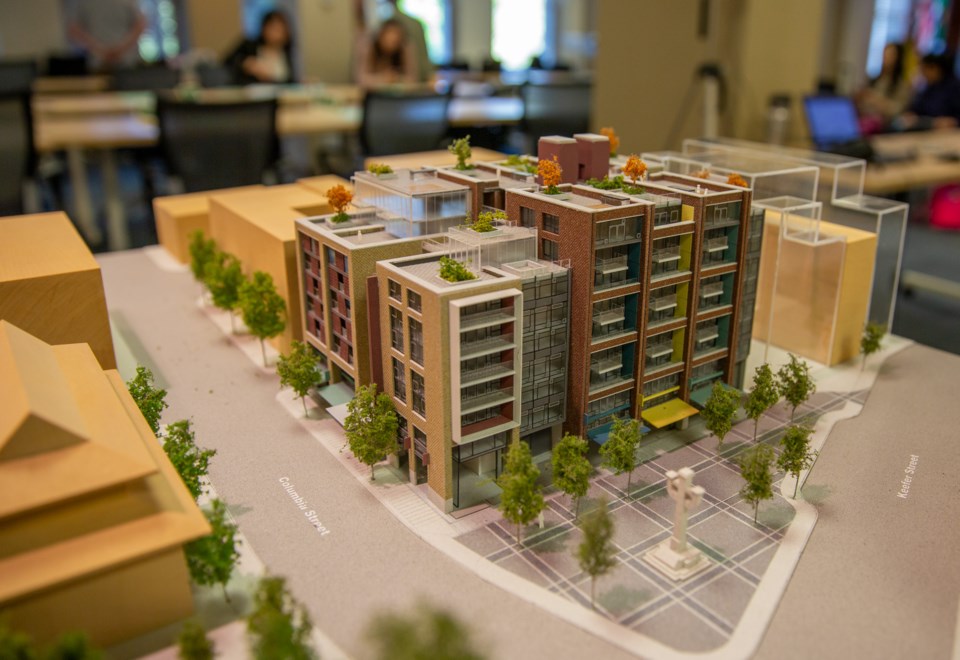Whichever way the vote goes, it will be controversial.
The city’s development permit board will decide June 26 on whether to approve a nine-storey, 111-unit condo in the heart of Chinatown.
Beedie (Keefer Street) Holdings Ltd. is the owner of the property at 105 Keefer St.
Since 2017, the developer has made two unsuccessful attempts to get a 12-storey — and then a nine-storey — building approved at the site, and is now before the board a third time because of a B.C. Supreme Court ruling.
To better understand the history of Beedie’s fight to get its project approved — and the fight from Chinatown citizens and others to ensure it doesn’t get built — the following is a timeline to set the stage for Monday’s vote.
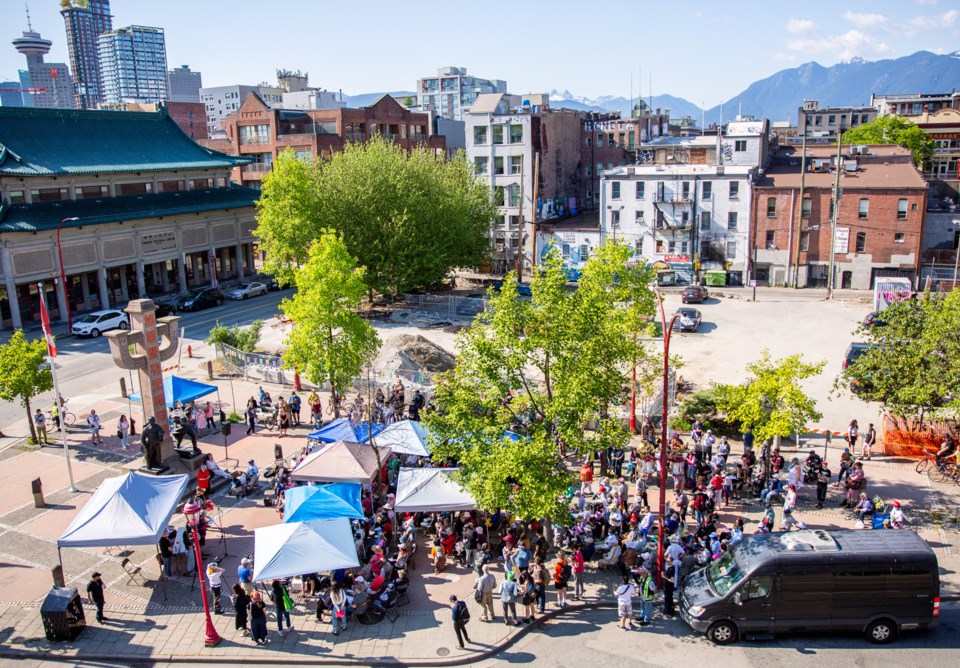
The site
Beedie acquired the property at 105 Keefer St. on July 13, 2013. It is adjacent to the Chinatown Memorial Plaza, which features a monument to Chinese railway workers and veterans. A gas station once occupied the site and it is now a parking lot and storage area for construction materials.
First rejection of the proposal
On June 13, 2017, the city council of the day — which was led by Mayor Gregor Robertson and his Vision Vancouver colleagues — rejected a 12-storey version of Beedie’s proposal. The vote was 8-3, with Robertson and seven councillors raising various concerns, saying the building’s design was too bulky and would block views and cast shadows on neighbouring Dr. Sun Yat-Sen Classical Chinese Garden.
Also, the building wouldn’t preserve the heritage and cultural character of Chinatown, and there wasn’t enough social housing in the plan, they said.
Coun. Raymond Louie was the lone Vision member to support the project, saying he couldn’t vote against social housing; the proposal called for 25 social housing units for seniors, although only three would be available at welfare rates.
Second rejection of the proposal
On Nov. 6, 2017, the development permit board rejected a nine-storey version of the proposal in a 2-1 vote. Beedie had decreased the height of its project to nine storeys, which meant it didn’t have to go before council again. The new design removed the 25 seniors’ apartments.
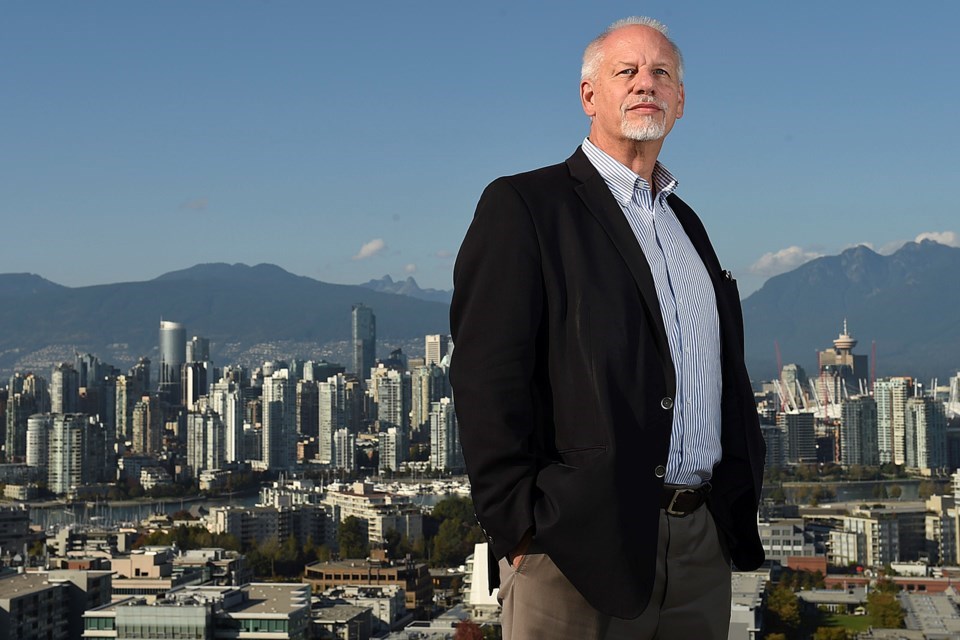
What were some of the reasons the development permit board rejected it?
Board members Jerry Dobrovolny, who was the city's chief engineer at the time, and Gil Kelley, the-then director of planning, rejected the application for reasons based primarily on design.
Current city manager Paul Mochrie, who was deputy city manager at the time, supported the project, saying the application met the requirements of existing zoning regulations.
What was Beedie’s reaction?
Houtan Rafii, vice-president of residential development for Beedie at the time, said outside city hall after the vote that he respected council’s decision and looked forward to working with the community on what the future of the site may hold.
Some councillors suggested the provincial and federal governments help purchase the land to retain the property for something that would keep with Chinatown’s culture and history.
Housing activists also called for a social housing building that would be rented at welfare rates.
A land swap with the developer was also mentioned.
“It’s been defeated today and that’s what we know,” said Rafii when asked about the suggestions and whether Beedie would proceed with another project at 90 feet tall. “We’re disappointed, we think it’s a loss for Chinatown.”
What did Beedie decide to do after being turned down by the development permit board?
On Dec. 6, 2017, Beedie appealed the permit board’s decision to the city’s Board of Variance. In February 2018, the Board of Variance indicated to Beedie that it had no jurisdiction to consider such an appeal.
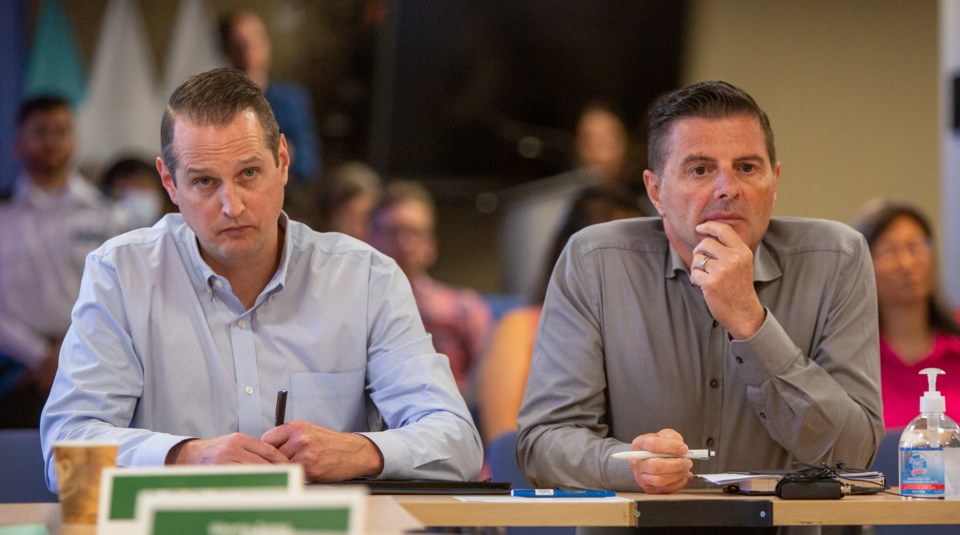
What happened next?
Beedie took court action against the city, beginning in August 2019. That led to a petition hearing over four days in June 2022. One of the affidavits from Beedie’s Katie Maslechko noted the board approved developments at 189 Keefer St., 137 Keefer St. and 239 Keefer St. on May 7, 2012, May 29, 2017 and Dec. 11, 2017, respectively.
Beedie’s Rob Fiorvento said in his affidavit that he conducted a review of city documents related to 111 development permit applications considered by the permit board between 2012 and 2017, including Beedie’s application.
Of the 111 — all of which were first vetted by city officials for general compliance with criteria set out in applicable city bylaws, policies and guidelines — Beedie’s application was the only one that was refused outright by the permit board.
What did the courts say?
B.C. Supreme Court Justice Jan Brongers said in a written decision released Dec. 13, 2022 that Beedie could return before the city’s development permit board to seek approval of its proposal at 105 Keefer St.
Brongers agreed with Beedie’s argument that the development permit board did not provide adequate reasons for rejecting the application in a 2-1 vote in November 2017.
“I therefore find that that the board’s Nov. 6, 2017 decision to reject the [development permit] application without indicating what conditions Beedie would need to satisfy in order for it to be approved is a departure from past practice that violated Beedie’s legitimate expectations,” Brongers said.
“In these circumstances, the board had a burden to explain and justify this departure in its reasons. However, I have searched in vain for such a justificatory explanation in the transcript of the board members’ remarks made at the Nov. 6, 2017 meeting, and in the Nov. 16, 2017 letter to Beedie that confirmed the denial of the [development permit] application. In the absence of such an explanation, I find that the board’s decision was unreasonable.”
Is Beedie’s current proposal before the development permit board different than the one rejected by the board in 2017?
No.
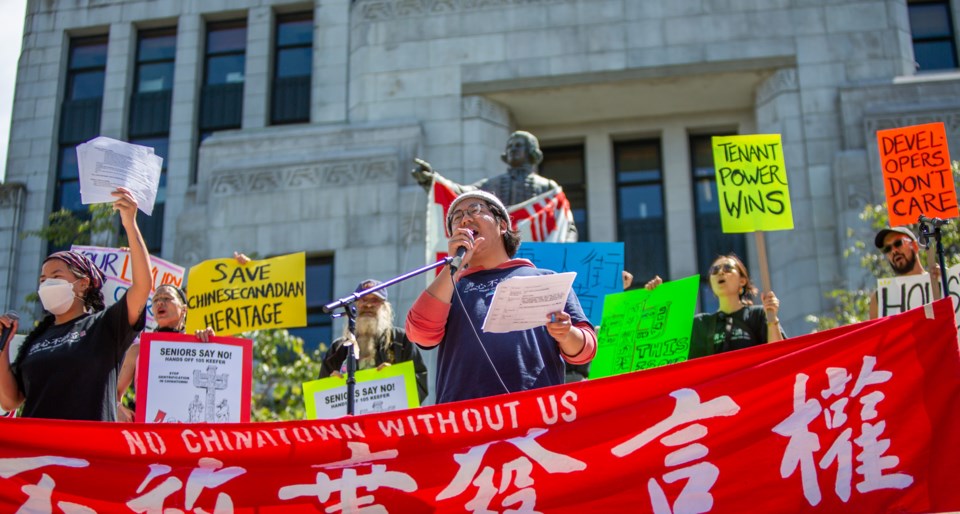
What has the turnout been like from the public at the two recent hearings before the development permit board?
Glacier Media counted approximately 115 people who spoke to the board May 29 and June 12, with at least 100 opposed to the project.
However, some of the supporters were there on behalf of groups with broad memberships, including the Urban Development Institute, the Chinatown Business Improvement Association, the Vancouver Chinatown Merchants Association, the Vancouver Chinatown Foundation, the Chinese Benevolent Association of Vancouver, Chinese Freemasons of Vancouver, the Chinese Cultural Centre of Greater Vancouver and the Dr. Sun Yat-Sen Classical Chinese Garden Society.
Leading up to the May 29 and June 12 hearings, organizers with the Vancouver Tenants Union and other groups mobilized several hundred people, including many seniors to join and speak at rallies held in Chinatown and outside city hall.
The turnout from opponents has been similar in size to the crowds who attended city hall in 2017 and urged first council and then the development permit board to reject Beedie’s 12-storey and nine-storey proposals.
Why don’t opponents support the project?
People who spoke to the board — many in Cantonese and Mandarin — and were interviewed by Glacier Media list many reasons, including the site’s proximity to the monument in the adjacent plaza that pays tribute to Chinese railway workers and war veterans.
The building’s design and size, its lack of social housing, concerns about gentrification and that it doesn’t fit the area were other reasons, with retired city planner Nathan Edelson saying about the Chinatown Memorial Plaza: “In effect, this square is a sacred space in Chinatown, and it should be showcased by any adjacent development as a contribution to the reconciliation to the Chinese, as well as to the Indigenous people that this city supports.”
What are supporters saying about the proposal?
Some Chinatown business owners who spoke at the hearings say the building will bring more people and customers to the neighbourhood, which has been struggling to rebound since the pandemic was declared in 2020.
Perry Lam, who owns Private and Co. men’s clothing store in Chinatown, pointed out Beedie’s property has been a vacant lot for many years.
“This development will surely beat another four years of an empty gravel field, which has attracted a lot of sketchy activity in the area,” he told the permit board June 12.
“We need seniors’ housing — we need all types of housing — but we also need to give those who are struggling like me, who has put so much on the line to open up a small business, a chance and some hope for our community.”
Will public pressure to reject the proposal make difference in the vote?
In the court action that Beedie launched back in 2019, the company alleged that the permit board’s decision in 2017 to reject the proposal was to “placate political opponents of the project,” according to Brongers’ ruling in 2022.
What Brongers said about that allegation
“I am unable to find on the basis of the circumstantial evidence identified by Beedie in its submissions that the board acted in bad faith by succumbing to political pressure and refusing the development permit application for irrelevant considerations. To the contrary, I agree with the City that the evidence before the court of the board members’ correspondence, actions, and words is consistent with an overriding concern that the board confine its consideration to the issue of whether the project’s proposed design merits approval.”
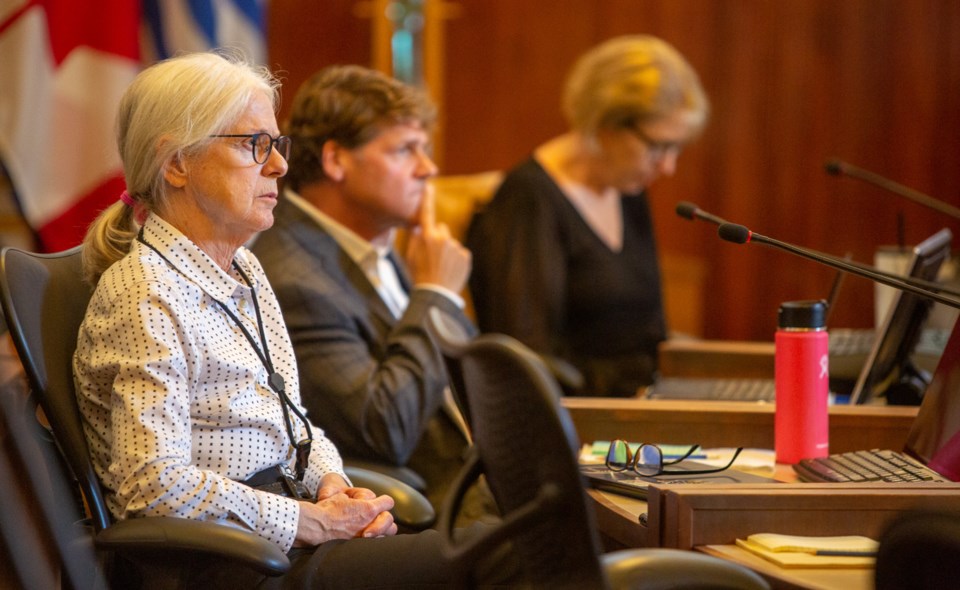
Which members of the development permit board will vote Monday?
Jerry Dobrovolny has since left his post at the city and is now the chief administrative officer of Metro Vancouver. Gil Kelley has also left the city, while Paul Mochrie is now the city manager.
Voting Monday will be Theresa O’Donnell, the city’s director of planning, Lon LaClaire, the city’s chief engineer, and Andrea Law, the general manager of development, building and licensing.
The meeting begins at 3 p.m. at city hall.
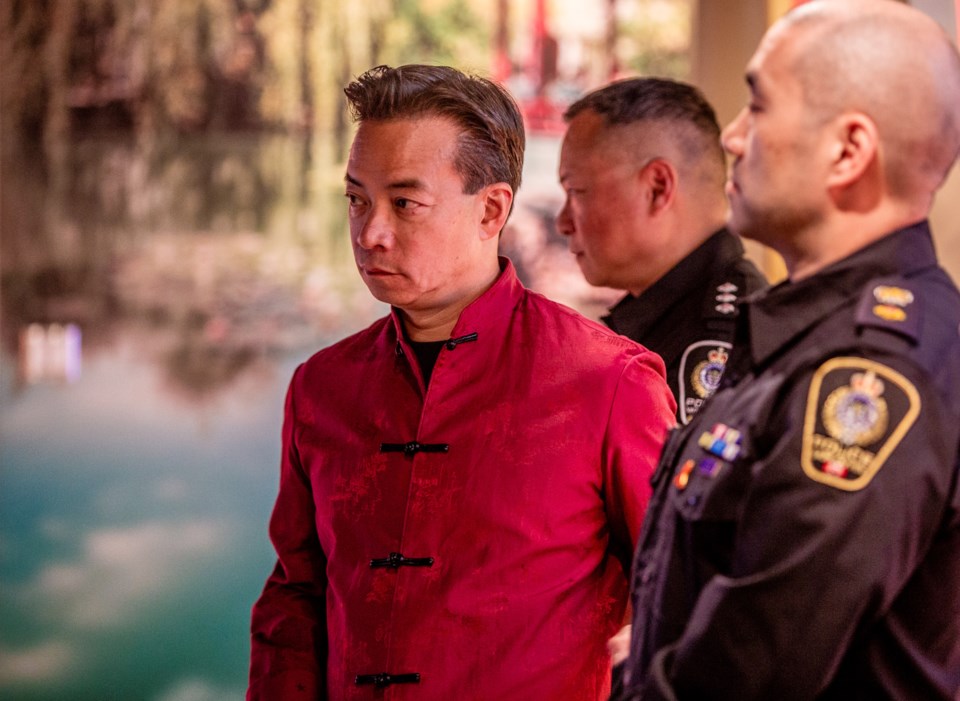
Does Mayor Ken Sim support the project?
He was asked that question Thursday at an unrelated event in Chinatown to announce the opening of a City of Vancouver satellite office at 112 Keefer St., which is located directly across the street from Beedie’s site.
This is what Sim said:
“I have my personal opinions, but what I can share with you is that it wouldn't be appropriate for me to comment. What I do support is let the process run, let individuals throughout the community have their say and we'll see where it goes.”
